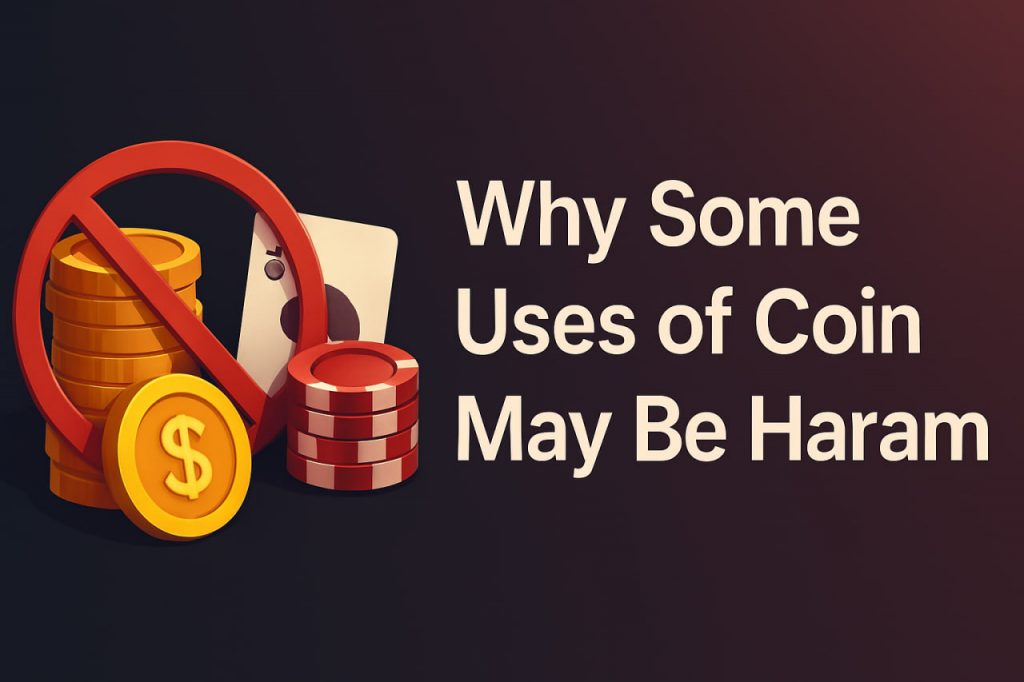Is Coin Halal or Haram to Play in Islam?

In today’s fast-evolving digital era, where technology continuously reshapes how we interact, work, and entertain ourselves, the world of gaming and online interaction has significantly expanded. With mobile games, social media platforms, and virtual environments becoming an integral part of daily life, elements like digital coins and tokens have taken center stage in the digital experience. These coins often act as currency for virtual transactions, game progression, or in-game decision-making tools such as coin flips. However, for Muslims striving to live by Islamic principles, the rise of digital entertainment raises an essential question: Is Coin Haram or Halal in Islam?
This comprehensive article explores the religious, ethical, and practical dimensions of using or playing with coins in various settings. We will investigate real-life scenarios, examine rulings from Islamic scholars, and refer to Quranic verses and hadiths to understand whether using coins in games is acceptable or impermissible from an Islamic point of view.
What is Meant by “Coin”?
In the context of this discussion, “coin” can encompass several different uses. Understanding the various forms is vital before determining if a coin-based activity is halal or haram.
- Physical Coin Tossing: A simple act of flipping a coin to make fair decisions, typically used in sports, games, or disputes.
- Digital Coins in Games: Virtual tokens earned or bought in mobile or online games that enable players to access features, upgrades, or additional levels.
- Cryptocurrency Coins: Decentralized digital assets like Bitcoin or Ethereum. (While relevant in other Islamic finance discussions, they are not the focus here.)
This article focuses on coins used for recreational purposes such as in gaming apps, decision-making tools, and entertainment environments that involve digital or virtual currency systems.
Play Halal-Approved Coin Flip Selected by Our Team
Most online coin flip games involve real-money betting and chance-based profit, which makes them haram in Islam. Our Shariah review team analyzed several versions and selected a halal-friendly coin game that removes all gambling aspects while keeping the simple, fun coin toss experience.
This halal coin game focuses only on prediction and entertainment — with no wagers, no jackpots and no money involved.
- ✔ Coin game reviewed and Shariah-checked
- ✔ No betting, no risk, no cash rewards
- ✔ A halal-friendly alternative to traditional coin flip gambling
Note: This is a Shariah-reviewed recommendation based on our team’s analysis. For personal religious rulings, please consult a qualified Islamic scholar.
Is Coin Halal or Haram? Quick Answer
The permissibility of using coins depends on the context in which they are used. Below is a table outlining several common scenarios:
| Context of Coin Use | Halal or Haram? | Reasoning |
|---|---|---|
| Coin tossing for decision-making | ✅ Halal | Neutral, fair method not involving money or unethical behavior |
| Playing games with coins (no real money involved) | ✅ Halal | Acceptable when free from gambling, inappropriate content, or time-wasting |
| Using coins in games with real money stakes | ❌ Haram | Considered gambling (Qimar), forbidden in Islam |
| Using digital coins in Islamic-compliant, free-to-play games | ✅ Halal | Permissible if content is educational, respectful, and ethical |
| Coin flipping for gambling or profit | ❌ Haram | Clearly gambling when used to bet or win rewards |
| Buying chance-based items using coins | ❌ Haram | Considered indirect gambling, relying on luck |
Why Some Uses of Coin May Be Haram

1. Gambling (Qimar)
Islam strictly forbids gambling. Any game or activity involving earning money or prizes based on chance rather than effort is considered Qimar, which is prohibited.
Quranic Reference:
“O you who have believed, indeed, intoxicants, gambling, [sacrificing on] stone alters [to other than Allah], and divining arrows are but defilement from the work of Satan, so avoid it that you may be successful.”
— Surah Al-Ma’idah (5:90)
Games or apps where coins can be bought or used to win randomized rewards (such as loot boxes, spin-the-wheel games, or surprise prize crates) mimic gambling behavior. This includes games that create an addictive loop or encourage repeated spending for chance-based rewards.
2. Addiction & Wasting Time
Islam places great importance on using time wisely. Activities that lead to prolonged distractions, neglect of religious duties, or reduced productivity are discouraged.
Spending excessive hours on games that use coin systems may interfere with responsibilities, family life, or spiritual practices. Even a halal activity can become makruh (discouraged) or haram if it dominates one’s time and attention.
When is Coin Considered Halal?
Coins may be considered halal when used in an environment that respects Islamic boundaries. The conditions below outline when their use is permissible:
✅ No Real Money Involved
Coins should be earned through gameplay and must not be linked to real currency purchases. Games that allow free progression without financial transactions are more likely to be halal.
✅ No Gambling or Lottery Elements
If coin-based mechanics involve elements of chance or unpredictability (e.g., randomized rewards, gacha systems), they resemble gambling and are haram. Coin usage should be based on skill or knowledge.
✅ Content Complies with Islamic Values
Games and apps must avoid nudity, vulgarity, violence, or anti-Islamic messages. Content promoting positive ethics, learning, and respectful themes supports a halal environment.
✅ Time and Focus are Managed
A game must not lead to neglect of worship (salah), Quran study, family obligations, or personal development. Moderation is key to maintaining balance and spiritual well-being.
Common Scenarios: Is Coin Halal or Haram?
| Activity | Verdict | Explanation |
| Tossing a coin to decide who gets the first turn in sports | Halal | A neutral act with no gambling or reward component |
| Using coins in educational Islamic quiz games | Halal | Encourages learning, rewards effort, and avoids unethical content |
| Buying coins to spin a random prize wheel | Haram | Engages chance-based mechanics, similar to gambling |
| Spending hours to earn coins for character customization | Makruh/Halal | Depends on time usage and content; excessive focus may lead to time wastage |
| Betting in-game coins with the possibility of real-world gain | Haram | Combines gambling and financial risk |
| Earning coins by watching ads or completing educational tasks | Halal | Promotes patience, effort, and knowledge |
Scholars’ Opinions on Coin Games

Islamic scholars generally place games into three categories based on their content and impact:
- Permissible Games (Halal): These promote education, skill, or relaxation and contain no gambling or inappropriate material. Coin systems used to encourage progress or reward effort fall into this category.
- Discouraged Games (Makruh): Games that do not directly involve haram elements but waste time or create addiction may be considered makruh. Excessive time spent on coin collection or upgrading characters may fall into this bracket.
- Prohibited Games (Haram): Games that promote gambling, unethical behavior, or include immoral content are clearly haram. Coin systems in these games often exploit players financially or spiritually.
Final Verdict: Is Coin Haram or Halal?
So, is coin haram? Is coin halal? The answer varies depending on the purpose and use.
- Halal: When coins are used in educational, ethical games that do not involve betting, gambling, or inappropriate themes.
- Haram: When coins are tied to real money, risk-based rewards, or addictive features that mirror gambling behavior.
Intent and context are everything. Muslims are encouraged to reflect on the consequences of their actions. Even if an activity appears harmless, it is essential to assess whether it aligns with Islamic principles.
Tips for Muslims Playing Online Games
To help maintain an ethical digital lifestyle, consider the following guidelines:
- Check the Game’s Content: Ensure the game promotes learning, relaxation, or healthy competition.
- Avoid Gambling Features: Stay away from games with mystery boxes, random draws, or betting elements.
- Set Healthy Limits: Allocate specific time blocks for gaming to prevent neglecting spiritual or family obligations.
- Consult Knowledgeable Scholars: Seek guidance from trusted Islamic scholars if uncertain about a specific game’s permissibility.
- Promote Positive Alternatives: Encourage the use of Islamic educational apps, puzzle games, or skill-based challenges in your community.
- Be a Role Model: Show others, especially younger family members, that fun can exist within halal boundaries.
Conclusion
In conclusion, is coin haram or halal to play in Islam? The ruling depends entirely on the game’s structure, how coins are acquired and used, and the broader context of the activity. If coins are part of a harmless, educational, or engaging environment free from risk, gambling, or sin, they are generally halal. However, if coins are involved in chance-based rewards, financial risks, or unethical content, they should be considered haram.
Always return to the guidance of the Prophet Muhammad (SAW):
“Leave that which makes you doubt for that which does not make you doubt.”
— Tirmidhi
As we navigate the digital age, let us remain conscious of our values and make choices that bring us closer to Allah, not further. Stay aware, stay mindful, and ensure your recreation is a reflection of your faith.

User Reviews
I always avoided coin flip games because they felt like pure gambling. Thanks to this site, I found a halal version with no money involved. Very comforting to finally enjoy it without worrying about haram elements.
The Shariah explanation here was extremely clear. The halal coin game you recommend is simple, fun and totally risk-free. Perfect for Muslims who want to avoid real-money gambling.
I’m grateful for this website’s guidance. I never thought a halal coin-flip alternative existed, but the option you provide is safe, Shariah-checked and enjoyable.
This page helped me stay away from gambling coin toss games. The halal version recommended here is clean and stress-free. Great job making this accessible for Muslims.